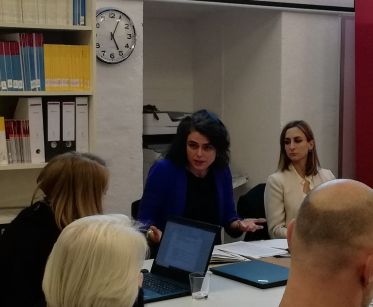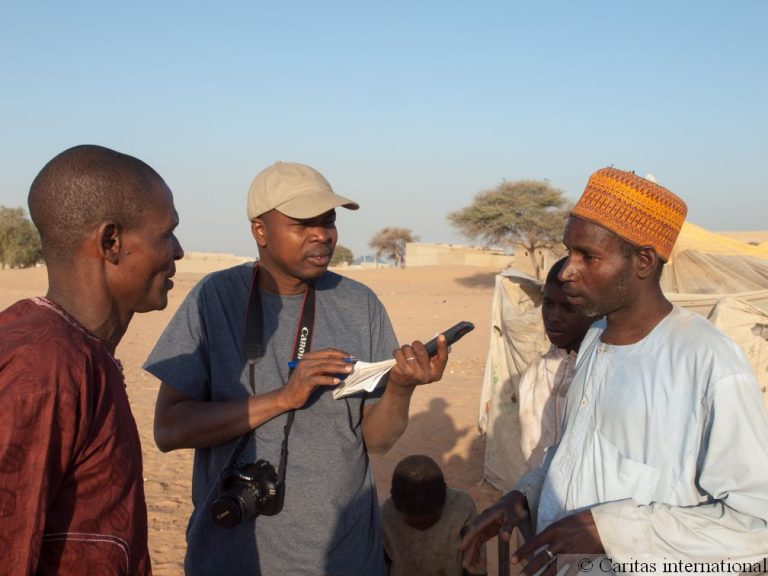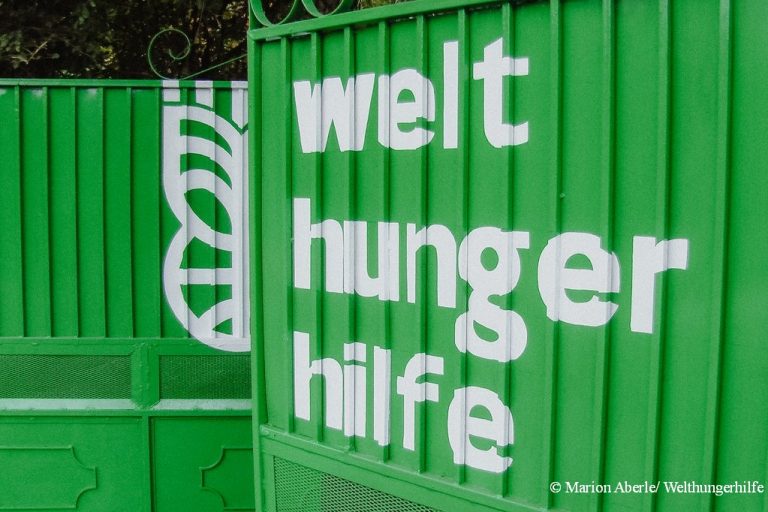Since the World Humanitarian Summit in 2016, the Triple Nexus has had a high priority in the humanitarian reform debate. Its declared aim is to link humanitarian action with development cooperation and peace work. But time and again there is a lack of practical experience in the mostly abstract debate as well as in research. The second event on the Triple Nexus organised by the Centre for Humanitarian Action (CHA) aimed to counteract this and discuss the concrete example of Mali. Representatives of international NGOs, of the Federal Foreign Office (GFFO), and of various think tanks and peace organisations took part in the event.
Why combining a faulty engine, a faulty wing and a faulty propeller? The plane won’t fly until the problems are addressed.
Anaïde Nahikian on the Triple Nexus in Mali
Anaïde Nahikian from the Harvard Humanitarian Initiative (HHI) and co-author of the study Realities and Myths of the Triple Nexus – Local Perspectives on Peacebuilding, Development, and Humanitarian Action in Mali presented the results of her work. Based on 130 interviews conducted with various stakeholders in Bamako and Central Mali between December 2018 and March 2019, the qualitative study concludes that the Triple Nexus approach in Mali is counterproductive and cannot realize the envisaged synergies of its three pillars. In addition, the Triple Nexus would entail substantial risks for independent humanitarian actors. The main reasons include three already relatively dysfunctional sectors of humanitarian action, development cooperation and peace work in Mali. Above all development programmes and “peace approaches” are strongly based on external security and migration policy interests and thus set a political agenda that is difficult to reconcile with humanitarian principles. Moreover, international efforts have not sufficiently integrated the Malian population into their planning and implementation processes. The Malian state has been substituted rather than empowered.
Coordination in Mali can only be described as a deadlock.
Andrea Steinke on the Triple Nexus in Mali
Andrea Steinke, CHA Fellow and project manager for the Triple Nexus, supplemented the impressions of the HHI study with her own research results. Her input focused especially on the effects of the Triple Nexus approach regarding coordination and financing of humanitarian interventions in Mali. In Mali, according to Andrea Steinke, the demand for increased networking of humanitarian actors with development and peace initiatives has turned into its opposite. The highly sensitive context with many military actors with different strategic interests – be it migration defence, secession efforts or the fight against terrorism – has further disintegrated the various areas. Humanitarian actors fear that through increased cooperation with military actors, including the UN mission MINUSMA, their work will be subject to a security paradigm and thus lose access to and trust in affected communities.

Which findings on the Triple Nexus can be taken beyond the Mali case study? Other humanitarian contexts have been mentioned which have led to less controversy over the coordination of the various actors, such as in Southern Sudan and Iraq. The animated discussion once again highlighted the centrality of needs-based humanitarian action, as well as the greater involvement of women actors at local and national levels. For too long, local knowledge and practices have been ignored, especially in the context of the Triple nexus and peace work based on sustainable concepts of “positive peace”.
A key to success, according to Anaïde Nahikian, is a responsible state that contributes to a better economic situation, less social inequality and thus more stability. The contribution that humanitarian organisations can and should make here was controversially discussed.
The first CHA event on the Triple Nexus took place in Berlin in June 2019.
The outcomes of the event are available for download here.
Article Download: 2019: Emmanuel Tronc, Rob Grace, and Anaïde Nahikian: Realities and Myths of the Triple Nexus – Local Perspectives on Peacebuilding, Development, and Humanitarian Action in Mali. Harvard Humanitarian Initiative
One of the projects of the Centre for Humanitarian Action (CHA) focuses on the Triple Nexus. Project leader is Andrea Steinke, who, together with three other colleagues, is currently working on an evaluation for Welthungerhilfe for the Triple Nexus.
The Harvard Humanitarian Initiative (HHI) is a university-wide academic and research center at Harvard University that promotes an interdisciplinary approach of understanding humanitarian action and of developing evidence-based approaches.





